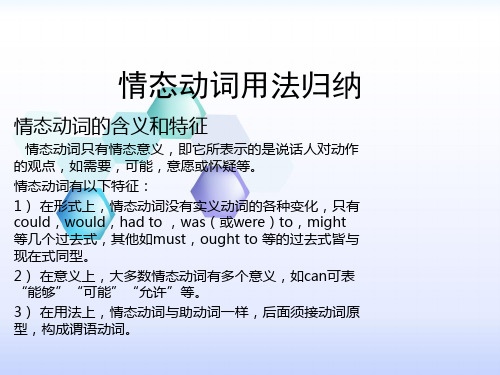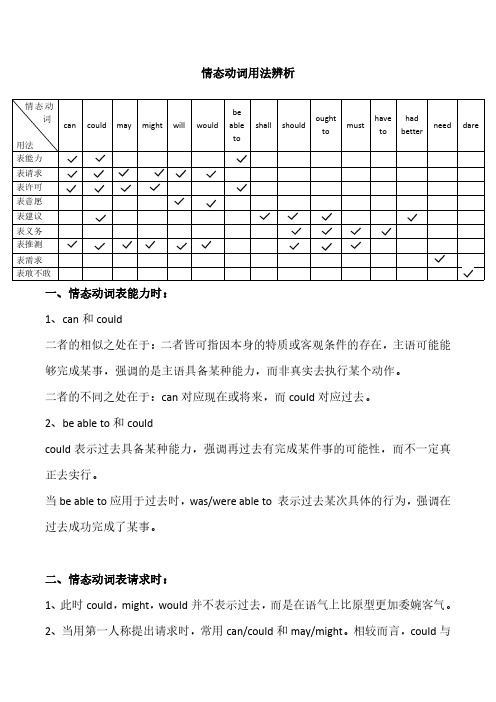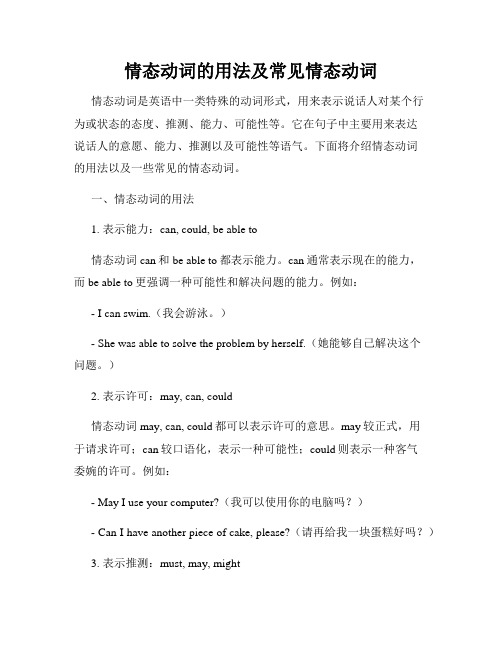情态动词的用法归纳终极版
- 格式:doc
- 大小:108.50 KB
- 文档页数:9

情态动词主要用法总结情态动词是用来表示说话人的态度、情感或意愿的动词。
情态动词有can、could、may、might、shall、should、will、would、must、need 等。
以下是情态动词的主要用法总结:1.表示能力:- Can:表示一般的能力或技能,意为“能够”。
- Could:表示过去的能力或技能,意为“能够”。
2.表示许可或允许:- Can:表示一般的许可或允许,意为“可以”。
- May:表示正式的或礼貌的许可,意为“可以”。
3.表示可能性:- May:表示可能性较大,意为“可能”。
- Might:表示可能性较小,意为“可能”。
4.表示意愿或请求:- Shall:用于第一人称中,表示提议、请求或建议,意为“将”。
- Should:用于第一人称或第三人称中,表示忠告、建议或期望,意为“应该”。
- Will:用于第一人称和第三人称中,表示意愿、决心或承诺,意为“将”。
- Would:用于第一人称和第三人称中,表示客气的请求、建议或愿望,意为“将”。
5.表示必要性或推测:- Must:表示必须性或应该性,意为“必须”。
- Should:表示推测、猜测或可能性较大的必要性,意为“应该”。
6.表示时间或条件:- Will/Would:表示未来时间或条件,意为“将/将会”。
7.表示推测或假设:- Must:表示肯定的推测,意为“一定”。
- May/Might:表示可能的推测,意为“可能”。
需要注意的是,情态动词本身没有人称和数的变化,后面的动词应为原形。
另外,他们常常与动词的原形连用构成谓语,可以用于各种句型,例如肯定句、否定句、疑问句等。

情态动词用法总结情态动词,又称情态助动词,是英语中一类特殊的助动词,包括can、could、may、might、must、shall、should、will、would等。
它们通常与动词原形搭配使用,用来表示说话人对动作或状态的态度、推测、许可、义务、建议等。
下面将分别从这几个方面进行总结情态动词的用法。
1. 表示能力和才能:can、could和able to都可以表示能力和才能,但用法稍有不同。
can和able to可以用来表示现在或将来的能力,而could则表示过去的能力或偶然的能力。
例如:- I can swim.(我会游泳)- She could speak three languages when she was 15.(她15岁时会说三种语言)- He was able to finish the task on time.(他能够按时完成任务)2. 表示推测和可能性:may、might和could可用来表示推测和可能性,其中may比might更常用,could表示可能性最低。
例如:- He may be at home.(他可能在家)- It might rain this afternoon.(今天下午可能会下雨)- She could be in the library.(她有可能在图书馆)3. 表示许可和禁止:can、could和may可用来表示许可,could表示客气一些。
而mustn't则表示禁止。
例如:- You can go now.(你可以走了)- Could I use your computer?(我能用一下你的电脑吗?)- You mustn't smoke here.(你不能在这里抽烟)4. 表示义务和必要性:must表示主观上的义务和必要性,常用来表示说话人的主观判断。
have to则表示客观上的必要性和强制性。
例如:- I must finish my homework tonight.(我必须今晚完成作业)- I have to get up early tomorrow.(我明天必须早起)5. 表示建议和推荐:should和ought to都表示建议或推荐,should更常用一些,ought to用得相对较少。


情态动词用法辨析情态动词用法can could may might will would be able to shall should ought to must have to had better need dare表能力表请求表许可表意愿表建议表义务表推测表需求表敢不敢一、情态动词表能力时:1、can 和could二者的相似之处在于:二者皆可指因本身的特质或客观条件的存在,主语可能能够完成某事,强调的是主语具备某种能力,而非真实去执行某个动作。
二者的不同之处在于:can 对应现在或将来,而could 对应过去。
2、be able to 和couldcould 表示过去具备某种能力,强调再过去有完成某件事的可能性,而不一定真正去实行。
当be able to 应用于过去时,was/were able to 表示过去某次具体的行为,强调在过去成功完成了某事。
二、情态动词表请求时:1、此时could ,might ,would 并不表示过去,而是在语气上比原型更加委婉客气。
2、当用第一人称提出请求时,常用can/could 和may/might 。
相较而言,could 与may在表请求的问句中出现的频率最高;might表发请求的语气最为委婉客气,因此反而很少见;而can则常用于熟人间的对话中。
语气强度:can>could/might>might3、当用第二人称提出请求时,常用can/could和will/would。
其中could和would 表达请求的语气更委婉客气;而can与will则常用于熟人对话中。
语气强度:can/will>could/would三、情态动词表许可时:1、与表请求不同,will/would不论前接第几人称,都表示主语本身的意愿,无需得到他人的“许可”,所以will/would不可以用于表请求的句中。
2、can和may二者都可以表示对现在或将来动作的许可,其中can的使用频率更高。

情态动词用法归纳(全)情态动词用法归纳情态动词是英语中的一类特殊动词,用于表达情感、态度、能力、推测和义务等。
它们常常用来修饰其他动词,帮助我们表达不同的意思。
在本文中,我们将归纳总结情态动词的用法,帮助读者更好地理解和运用这些动词。
一、态度和情感1. Can (能够)Can用来表示某种态度或情感,常用于表示能力、允许和请求等。
例如:- I can swim. (我会游泳。
)- Can I borrow your pen? (我可以借用你的钢笔吗?)- You can't be serious! (你不可能是认真的!)2. Could (可能)Could用来表示过去的能力、允许和请求等。
它还可以用来表示某种可能性。
例如:- When I was younger, I could run faster. (我年轻的时候跑得更快。
)- Could I ask you a question? (我可以问你一个问题吗?)- It could rain later, so bring an umbrella. (今天后面可能会下雨,所以带上雨伞。
)3. May (可能)May常表示许可、请求和推测等。
它还可以用来表示某种可能性或希望。
例如:- May I use your phone? (我可以用一下你的手机吗?)- It may rain tomorrow. (明天可能会下雨。
)- They may arrive late. (他们可能会迟到。
)4. Might (可能)Might与may的用法类似,但表示的可能性稍微低一些。
例如:- She might be busy. (她可能很忙。
)- I might go to the party, but I'm not sure yet. (我可能会去参加派对,但我还不确定。
)二、能力和推测1. Must (必须)Must用来表示强烈的推断或必要性。

情态动词的用法及常见情态动词情态动词是英语中一类特殊的动词形式,用来表示说话人对某个行为或状态的态度、推测、能力、可能性等。
它在句子中主要用来表达说话人的意愿、能力、推测以及可能性等语气。
下面将介绍情态动词的用法以及一些常见的情态动词。
一、情态动词的用法1. 表示能力:can, could, be able to情态动词can和be able to都表示能力。
can通常表示现在的能力,而be able to更强调一种可能性和解决问题的能力。
例如:- I can swim.(我会游泳。
)- She was able to solve the problem by herself.(她能够自己解决这个问题。
)2. 表示许可:may, can, could情态动词may, can, could都可以表示许可的意思。
may较正式,用于请求许可;can较口语化,表示一种可能性;could则表示一种客气委婉的许可。
例如:- May I use your computer?(我可以使用你的电脑吗?)- Can I have another piece of cake, please?(请再给我一块蛋糕好吗?)3. 表示推测:must, may, might情态动词must表示说话人对某个事实的肯定推测;may和might则表示可能性。
may较肯定,而might较委婉。
例如:- He must be tired, as he worked all day.(他一定很累,因为他整天都在工作。
)- She may/might be late.(她可能会迟到。
)4. 表示必须:must, have to情态动词must表示说话人对某个行为的强制性要求;have to则表示客观上的必须。
例如:- You must finish your homework before you go out.(你必须在出门前完成作业。
)- I have to go to work tomorrow.(我明天必须去上班。
有关情态动词的用法一、Can的用法(一)基本用法1. Can表示能力,即某人“能”或“会”做某事。
- I can speak English fluently.(我能流利地说英语。
)- He can run really fast. He's like a cheetah!(他能跑得非常快,他就像一只猎豹!)2. 用于请求许可,通常用于非正式场合。
- Can I have a glass of water? I'm so thirsty, it feels like I'm in a desert!(我可以喝杯水吗?我太渴了,感觉就像在沙漠里一样!) - Can you pass the salt? It's right in front of you, it's not a big ask.(你能递给我盐吗?它就在你面前,这不是什么大要求。
)3. 表示可能性,常用于否定句和疑问句中。
- It can't be true. That's just too crazy!(这不可能是真的,那太疯狂了!)- Can it rain today? The sky looks a bit gloomy, like it's undecided what to do.(今天会下雨吗?天空看起来有点阴沉,就像它还没决定要怎么做似的。
)(二)固定搭配1. Can't help doing sth. 忍不住做某事。
- She can't help laughing when she sees the funny video. It's just so hilarious!(当她看到这个搞笑的视频时,她忍不住笑了。
真是太滑稽了!)- I can't help feeling excited about the uing trip. It's like a dreaming true!(对于即将到来的旅行,我忍不住感到兴奋。
高中英语知识点归纳情态动词的用法与义项情态动词是英语中一个重要的语法现象,是一种特殊的动词形式,用来表示说话人的态度、意愿、可能性、能力、推断等。
情态动词一般不能单独使用,而是与其他动词连用,构成动词词组来表示各种意义。
下面是对高中英语知识点归纳情态动词的用法与义项的总结。
一、情态动词的意义划分:1. 可能性(Possibility)情态动词:may, might, could, can用法:- may, might, could用于表示事情有可能发生或存在;- can主要用于表示某人具备某种能力。
示例:- It may rain tomorrow. (明天可能会下雨)- He might be at home. (他可能在家)- The key could be in the drawer. (钥匙可能在抽屉里)- I can speak Spanish. (我会说西班牙语)2. 动作愿望(Desire)情态动词:would like, want, wish用法:- would like用于表示客气地提出请求或愿望;- want用于表示强烈的需求或欲望;- wish用于表示遗憾或对现在情况的不满或希望。
示例:- I would like to have a cup of coffee. (我想来一杯咖啡)- She wants to go shopping. (她想去购物)- I wish I had more free time. (我希望我有更多的空闲时间) 3. 推测与推断(Speculation)情态动词:must, may, might用法:- must用于表示说话人根据某种依据做出肯定的推测; - may, might用于表示可能性的推测。
示例:- It must be raining outside. (外面肯定在下雨)- He may/might be busy right now. (他可能正忙)4. 动作能力(Ability)情态动词:can, could用法:- can表示某人具备某种能力;- could表示过去的能力或给予请求、许可的非正式方式。
情态动词的用法完整详细情态动词定义:情态动词是一种本身有一定的词义,但要与动词原形一起使用,给谓语动词增添情态颜色,表示说话人对有关行为或事物的态度和看法,认为其可能、应当或须要等。
情态动词后面加动词原形。
分类:情态动词有四类:①只做情态动词:must,can(could),may(might),ought to①可做情态动词又可做实义动词:need,dare①可做情态动词又可做助动词:shall(should),will(would)①具有情态动词特征:have(had) to,used to位置:情态动词在句中放在谓语动词之前, 谓语动词前若有助动词,则在助动词之前,疑问句中, 情态动词则在主语之前。
I can see you. Come here.我能看见你,过来吧。
He must have been away.他一定走了。
What can I do for you?我能帮你吗?How dare you treat us like that!你怎能那样对待我们!特点:情态动词无人称和数的变化, 情态动词后面跟的动词需用原形,否定式构成是在情态动词后面加"not"。
个别情态动词有现在式和过去式两种形式, 过去式用来表达越发客气, 委婉的语气, 时态性不强, 可用于过去,现在或未来。
情态动词属非及物动词,故没有被动语态。
情态动词没有非谓语形式,即没有不定式,分词,等形式。
He could be here soon.他很快就来。
We can't carry the heavy box.我们搬不动那箱子。
I'm sorry I can't help you.对不起,我帮不上你。
基本助动词与情态助动词最主要的区分之一是,基本助动词本身没有词义,而情态助动词则有自己的词义,能表示说话人对有关动作或状态的看法,或表示主观设想:What have you been doing since? (构成完成举行体,本身无词义)I am afraid I must be going. (一定要)You may have read some account of the matter. (或许已经)除此之外,情态助动词还有如下词法和句法特征:1)除ought和used以外,其他情态动词后面只能接不带to的不定式。
情态动词的用法情态动词是英语中一类具有特殊功能的动词,它们用来表示说话人对某种可能性、能力、意愿、允许或推测的态度。
情态动词包括can、could、may、might、shall、should、will、would、must等。
在本文中,我们将对这些情态动词的用法进行详细介绍。
1. 表示能力情态动词can表示说话人具备某种能力。
例如:He can swim.(他会游泳。
)注意:can在现在时态中表示现在或经常性的能力,在过去时态中表示过去的能力。
2. 表示推测情态动词may、might用于表示推测或猜测的意思。
例如:She may be late for the meeting.(她可能会迟到会议。
)注意:may表示可能性较高,might则表示可能性较低。
3. 表示意愿情态动词will、would表示说话人的意愿、愿望或请求。
例如:I will help you.(我愿意帮助你。
)注意:would常用于表示比较客气的请求。
4. 表示推测的过去情态动词must常用于表示对过去情况的推测或肯定。
例如:He must have missed the bus.(他肯定错过了公交车。
)注意:must用于表示对过去情况的肯定,而might用于表示对过去情况的推测。
5. 表示义务或必要性情态动词must表示对义务、必要性或确定性的肯定。
例如:You must finish your homework.(你必须完成作业。
)6. 表示建议或应该情态动词should表示建议或应该。
例如:You should go to bed early.(你应该早点睡觉。
)注意:should还可以表示对过去情况的推测,例如:He should have arrived by now.(他现在应该已经到达了。
)7. 表示允许或许可情态动词can与may可以用于表示许可或允许。
例如:Can I borrow your pen?(我可以借你的钢笔吗?)8. 表示可能性情态动词could用于表示可能性。
情态动词的用法要点情态动词的基本用法1.Can could表示能力,允许和有把握的推断2.May, might表允许、祝愿,表推测语气轻如棉3.Must表必须、必要,表推测预期重如山4.Shall用于一三人称征求意见;用于二三人称表说话人的命令、允诺、威胁或警告也常见5.Should=ought to 表可能、建议、命令或劝告。
6.Will,would表意志、意愿和习惯;用于第二人称疑问句征求意见;用于二三人称表推测也常见。
7.Need,dare兼作实动和情动8.Need作情动,在疑问或否定中显神通9.Dare作情动,只“敢于”用在疑问、否定或条件句中10. Dare作实动,后接to句子才通11. 情态动词+完成时的用法12. 情态动词语气的强弱13. would和used to(do)的区别14. must和have to的区别15. 其它一.can和could特别说明:(1)could用来表示请求时,语气委婉,主要用于疑问句,不能用于肯定句,答语应用can(即:could不能用于现在时态的简略答语中)。
如:——Could I use your dictionary?——Yes, you can.(否定回答可用:No, I’m afraid not.)(2)can和be able to辨析can(could)和be able to都可以表示能力,意思上没有区别。
但can只有现在式和过去式,而be able to则有更多的形式。
如:I’ve always wanted to able to speak fluent English.Those bags look really heavy, are you sure you’ll be able to carry them on your own?但是,表示在过去某时的某一场合经过一番努力,终于做成了某事,通常不用could,而用was/were able to来表示。
这时,was/were able to相当于managed to do或succeed in doing。
如:After the accident it was a long time before she was able to walk again.The fire was very big, but most people were able to escape from the building.(3) 惯用形式“cannot …too…”表示“无论怎么……也不(过分)”。
如:You cannot be too careful.你越小心越好。
惯用形式“cannot but+ 不定式(不带to)”表示“不得不,只好”。
如:I cannot but admire her determination.我不得不钦佩你的决心。
二.may和might二.must和have to四.shall和should五.will和would特别说明:would与used to辨析would可用来表示过去反复出现的动作,但不能表示过去存在的状态,所以我们不能说:“she would be a quiet girl.”另外,would强调过去某种特定情况下的活动,是完全过去的事情,同现在没有联系。
而used to则着眼于过去和现在的对比,隐含现在已不存在,动作或状态都可表示。
Would可以表示不规则的习惯,used to则不可。
如:He used to be a naughty boy and cause trouble.I used to get up at six in the morning.Sometimes she would take a walk in the neighboring woods.In those days, whenever I had difficulties, I would go to Mr. Chen for help.六.need和dare七.ought的用法:说明:should与ought to 表示“应该”时的区别should 表示自己的主观看法,而ought to的语气中,含有“按道理应该……”之意。
若要反映客观情况或涉及法律义务和规定,一般用ought to。
如:You should help them with their work.You are his father. You ought to get him to receive good education.八.情态动词表推测1. 熟记情态动词的语气特点和用法限制。
1)表示肯定的猜测时,各情态动词语气强弱如下:最强——must(一定)will (很有可能)would(很有可能)ought to(应该,很有可能)should(应该,很有可能)can(可能)could(可能)may(可能)最弱——might(可能)肯定句不能用can;否定句mustn't需让贤;疑问句can, could伸手大显。
2)表示否定的猜测时can't / couldn't语气最强,指“不可能”;may / might not语气最弱,意思是“可能不”。
3) 一些情态动词表猜测时的用法限制。
must只用于肯定句;may/ might一般不用于疑问句;could可用于各种句式;而can多用于否定句、疑问句,用于肯定句时,多指“客观可能性”。
如:Lightning can be very dangerous.闪电可能会非常危险。
2. 把握题干猜测语气的强弱。
题干中如果有客观依据,应该选择猜测语气最强的情态动词;如果没有客观依据,则应选择猜测语气最弱的情态动词。
如:—Are you coming to Jeff's party?—I'm not sure. I ________go to the concert instead.A. mustB. wouldC. shouldD.might本题中的猜测没有客观依据。
说话人对是否会去参加聚会还没拿定主意,去听音乐会也仅仅是有可能而已。
因此,应选语气最弱项,答案为D“情态动词+have done”用法不再对一件事情是否发生进行猜测,而是对已发生的事表达自己的看法,有时具有一定的感情色彩。
1) You____ all those clothes! We have a washing machine to do that sort of thingA) needn't have washed B) shouldn't have washedC) must not have washed D) can not have washed2) John's score on the test is the highest in the class; he____ last night.A) should study B) should have studied C) must have studied D) must have to study3) The room is in a terrible mess; it ____cleaned. (CET-4, 1996,6)A) can't have been B) shouldn't have been C) mustn't have been D) wouldn't have been4) Nobody knows how people first came to these islands. They ____ from South America on rafts.A) must have sailed B) can sail C) might have sailed D) should have sailed5) Mary was not in her bedroom yesterday afternoon. She ____ in her classroom.A) should have been B) must have been C) must be D) should be6) Bob said he was going to join our club but he didn't. He ____ his mind.A) can't have changed B) wouldn't have changedC) must have changed D) shouldn't have changedYou____ to town to see the film yesterday. It will be on TV tonight.A) needn't go B) had better not go C) should not go D) needn't have gone8) We____ the letter yesterday, but it didn't arrive.A) must receive B) ought to receive C) must have received D) ought to have received9) With all the work on hand, he____ to the cinema last night.A) mustn't go B) shouldn't have gone C) could not go D) couldn't have gone10) Eve was late for class again. She ____earlier.A) should get up B) must get up C) need to get up D) should have got up11) I am feeling sick. I____ so much chocolate.A) needn't have eaten B) couldn't have eatenC) mustn't have eaten D) shouldn't have eaten12) I didn't send out my application form last week, but I ____.A) had B) would do C) should have D) might have to13) Walking alone in the deserted village, John was scared. He thought he____ Tom to go with him.A) might have asked B) should asked C) must have asked D) should have asked14) When I got to the cinema, the film had already started; I____ there earlier.A) ought to get B) ought to have got C) must have got D) must get15) The road was muddy. It____ last night.A) must rained B) must have rained C) must be rained D) could have rained16) She can speak quite fluent English. She____.A) must been in the U.S.A. for some timeB) must have been in the U.S.A. for some timeC) should have been in the U.S.A. for some timeD) May be in the U.S.A. for some time17) You should bear in mind that he is not so strong as he____.A) was used to be B) used to be C) was used to D) use to18)“We didn't see him at the exhibition yesterday.”“He ___it.”A) mustn't visit B) can't have visited C) should have gone to see D) may see19) Mary ____my letter, otherwise she would have replied before now.A) should have received B) has receivedC) Couldn't have received D) ought to have received20) I ____ you a valuable present for your birthday, but I was short of money.A) would have liked to give B) liked to giveC) have liked to give D) would like to give21)“Where ____ my umbrella?”“Somebody ____ it away by mistake.”A) is, must have taken B) is, must take C) have been, must take D) is, takes22) What ____ would happen if the director knew you felt that way?A) will you suppose B) you suppose C) do you suppose D) you would suppose23) Two eyes ____see more than one.A) can B) may C) will D) should24) ____ you continue in your efforts and achieve new and greater successes.A) Would B) Will C) May D) Should25) We ought to help each other in our work, ____?A) oughtn't we B) should we C) shouldn't we D) ought to we26) Tom ____ better than to ask Dick for help.A) shall know B) shouldn't know C) has known D) should have known27) You ____ your tooth pulled out before it rot completely.A) had better got B) had to get better C) had better to get D) had better get28) When we got to the cinema, the film hasn't started yet, so we ____.A) needn't hurry B) didn't need hurry C) needn't to hurry D) needn't have hurried29) It was really very dangerous; you ____ him seriously.A) might have injured B) could injure C) should have injured D) must injure30) As he had heart attack, he was told that he ____ continue the work.A) needn'tB) may not C) mustn't D) can't31) An Englishman who ____not speak Italian was once traveling in Italy.A) must B) could C) may D) might32) I ____like to make a suggestion.A) could B) would C) must D) might33) I know things are hard with you, but you ____try to get over the difficulties.A) can B) may C) must D) ought34 I can't find the recorder in the room. It ____ by somebody.A) may have been taken away B) may leave C) may take away D) must have taken away35) He ____the 9:20 train because he didn't leave home till 9:25.A) can reach B) could catch C) may not catch D) couldn't have caught情态动词部分练习题答案1)A 2)C 3)A 4)C 5)B 6)C 7)D 8)D 9)D 10)D11)D 12)C 13)D 14)B 15)B 16)B 17)B 18)C 19)C 20)A21)A 22)C 23)A 24)C 25)A 26)D 27)D 28)D 29)A 30)C31)B 32)B 33)C 34)A 35)D。